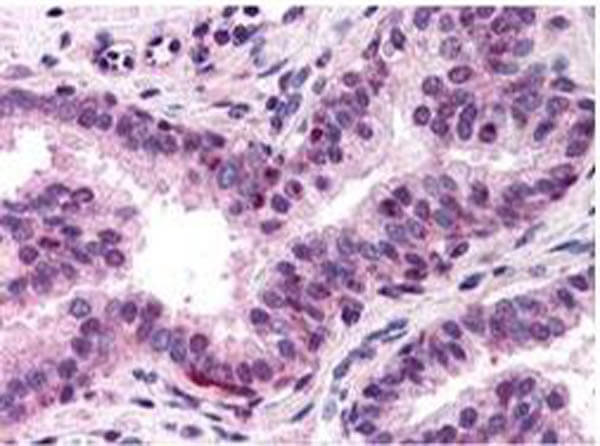Anti-NF-Y (A subunit) (RABBIT) Antibody
NF-Y Antibody
- SPECIFICATION
- CITATIONS
- PROTOCOLS
- BACKGROUND
| Host | Rabbit |
|---|---|
| Conjugate | Unconjugated |
| Target Species | Human |
| Reactivity | Human |
| Clonality | Polyclonal |
Application
| WB, IHC, E, I, LCI |
| Application Note | Anti-NF-Y (A subunit) Antibody was tested by immunoblot and found to be reactive against NF-Y (A subunit specific) at a dilution of 1:6,000 followed by reaction with Peroxidase conjugated Affinity Purified anti-Rabbit IgG [H&L] (Goat). Anti-NF-Y (A subunit specific) is suitable for the detection by immunoblot of human and mouse NF-Y. Negligible reactivity was observed against the B subunit of NF-Y. Anti-NF-Y (A subunit) Antibody was also tested in a gel supershift assay and found to be reactive against NF-Y using 1.0 to 2.0 µl per assay. Anti-NF-Y was tested in IHC using human prostate tissue with 10 µg/mL. Specific conditions should be optimized by user. |
| Physical State | Liquid (sterile filtered) |
| Immunogen | NF-Y (A subunit specific) peptide corresponding to a region near the N-terminus of the human protein conjugated to Keyhole Limpet Hemocyanin (KLH). |
| Preservative | 0.01% (w/v) Sodium Azide |
| Gene ID | 4800 |
|---|---|
| Other Names | 4800 |
| Purity | Anti-NF-Y (A subunit) Antibody was prepared from monospecific antiserum by delipidation and defibrination. |
| Storage Condition | Store vial at -20° C prior to opening. Aliquot contents and freeze at -20° C or below for extended storage. Avoid cycles of freezing and thawing. Centrifuge product if not completely clear after standing at room temperature. This product is stable for several weeks at 4° C as an undiluted liquid. Dilute only prior to immediate use. |
| Precautions Note | This product is for research use only and is not intended for therapeutic or diagnostic applications. |
| Name | NFYA |
|---|---|
| Function | Component of the sequence-specific heterotrimeric transcription factor (NF-Y) which specifically recognizes a 5'-CCAAT-3' box motif found in the promoters of its target genes. NF-Y can function as both an activator and a repressor, depending on its interacting cofactors. NF-YA positively regulates the transcription of the core clock component BMAL1. |
| Cellular Location | Nucleus. |

Thousands of laboratories across the world have published research that depended on the performance of antibodies from Abcepta to advance their research. Check out links to articles that cite our products in major peer-reviewed journals, organized by research category.
info@abcepta.com, and receive a free "I Love Antibodies" mug.
Provided below are standard protocols that you may find useful for product applications.
Background
Nuclear transcription factor Y subunit alpha is a protein that in humans is encoded by the NFYA gene. The protein encoded by this gene is one subunit of a trimeric complex, forming a highly conserved transcription factor that binds to CCAAT motifs in the promoter regions in a variety of genes. Subunit A associates with a tight dimer composed of the B and C subunits, resulting in a trimer that binds to DNA with high specificity and affinity. The sequence specific interactions of the complex are made by the A subunit, suggesting a role as the regulatory subunit. In addition, there is evidence of post-transcriptional regulation in this gene product, either by protein degradation or control of translation. Further regulation is represented by alternative splicing in the glutamine-rich activation domain, with clear tissue-specific preferences for the two isoforms. Anti-NF-Y is ideal for investigators involved in transcription factor research.
If you have used an Abcepta product and would like to share how it has performed, please click on the "Submit Review" button and provide the requested information. Our staff will examine and post your review and contact you if needed.
If you have any additional inquiries please email technical services at tech@abcepta.com.













 Foundational characteristics of cancer include proliferation, angiogenesis, migration, evasion of apoptosis, and cellular immortality. Find key markers for these cellular processes and antibodies to detect them.
Foundational characteristics of cancer include proliferation, angiogenesis, migration, evasion of apoptosis, and cellular immortality. Find key markers for these cellular processes and antibodies to detect them. The SUMOplot™ Analysis Program predicts and scores sumoylation sites in your protein. SUMOylation is a post-translational modification involved in various cellular processes, such as nuclear-cytosolic transport, transcriptional regulation, apoptosis, protein stability, response to stress, and progression through the cell cycle.
The SUMOplot™ Analysis Program predicts and scores sumoylation sites in your protein. SUMOylation is a post-translational modification involved in various cellular processes, such as nuclear-cytosolic transport, transcriptional regulation, apoptosis, protein stability, response to stress, and progression through the cell cycle. The Autophagy Receptor Motif Plotter predicts and scores autophagy receptor binding sites in your protein. Identifying proteins connected to this pathway is critical to understanding the role of autophagy in physiological as well as pathological processes such as development, differentiation, neurodegenerative diseases, stress, infection, and cancer.
The Autophagy Receptor Motif Plotter predicts and scores autophagy receptor binding sites in your protein. Identifying proteins connected to this pathway is critical to understanding the role of autophagy in physiological as well as pathological processes such as development, differentiation, neurodegenerative diseases, stress, infection, and cancer.


